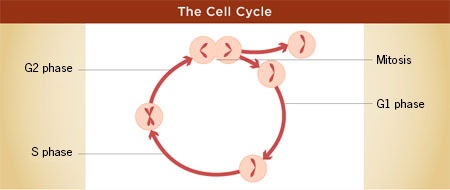The Cell Cycle
There are many kinds of chemo drugs. Different types of chemo drugs work on different phases of the cell cycle. The cell cycle is a series of phases that all cells, both normal and cancerous, go through to form new cells. The cycle begins with the cell in a resting phase. In the G1 phase, the cell grows larger and begins to make proteins. The S phase is where chromosomes are copied so the 2 new cells that will be created will have identical DNA. In G2, the cell begins to divide. Finally, the cell splits into two cells. This last phase is known as mitosis. Ask your doctor if you are interested in learning how the drugs in your treatment plan affect the cell cycle.

Classes of Commonly Used Chemo Drugs
This is not a complete list of chemotherapy drug classes, but it can offer you an idea of how chemo drugs are classified and how they work in terms of the cell life cycle. These drugs may be combined to attack cancer cells in different ways.
- Alkylating agents: These types of drugs interfere with the way cells work and can kill cells in various phases of the cell cycle.
- Antimetabolites: These drugs affect how a cell functions by replacing natural substances in the DNA that cells need to grow. Without these natural substances, cells cannot reproduce and eventually die.
- Plant alkaloids: These drugs are made from plants. They work by preventing cells from dividing in two.
- Mitotic inhibitors: These drugs are made from plants and other natural products. They work by preventing cells from dividing.
- Antitumor antibiotic These drugs prevent cells from reproducing.
- Topoisomerase inhibitors: These drugs block certain enzymes that cells need to reproduce.
All types of chemotherapy drugs cause side effects. No matter which one you are taking, you should speak with your doctor and care team about what to expect. Being prepared and knowing how you can help manage side effects may help you stay on schedule.
Support Treatments
Chemo side effects are related to the damage chemo does to your body's normal cells. You may need to take medications or other treatments that help you manage or minimize various side effects of chemo drugs.
Supportive treatments can include:
- Transfusions
- Drugs that treat nausea
- Meds that ease the pain of peripheral neuropathy
- Special mouthwash to prevent sores
Speak with your doctor and care team about treatments to manage your chemo side effects.
Tips to Help You Stay on Schedule
Your doctor has prescribed a specific dose of chemo. He or she has also created a chemo schedule with the hope of providing the best chance of meeting your treatment goals. Try your best to stay on schedule. Studies have shown that patients who receive chemo at the prescribed dose may have a better treatment response.
Here are some helpful tips to help you stay on schedule:
- Get support from friends and family members in ways that will make going through treatment easier.
- Plan meals in advance. Make and freeze food, or ask friends to help by bringing meals to your house.
- Schedule social and family events around your treatment plan. Make sure to stay active and engaged when you are feeling up to it.
- Keep a treatment calendar. Keep track of your side effects and tell your doctor how you are feeling throughout your treatment.
- Talk to your doctor and care team about what you can do to address chemo side effects.
|
A Closer Look: Regina*
 |
|---|
| Regina has had a recurrence of breast cancer. It's been 3 years since her last chemo treatments. |
| Her previous treatments went well, but she did have some treatment delays. This time around, she is determined to do all she can to manage side effects so she can stay on her treatment schedule. |
| She asks her best friend to be her caregiver. Four of her neighbors agree to make meals for her and drive her to chemo treatments. |
| Regina and her doctor review all her treatments and their possible side effects. |
| She keeps a binder with her schedule, personal contacts, lab tests, and notes from doctor's visits. |
| She speaks with her doctor about supportive treatments that may help her lower her risk for side effects usually associated with her chemo. |
| She joins a cancer support group which meets at her cancer clinic. |
| She speaks with her care team about getting reimbursed through insurance for a wig. |
*This is a fictional case study based on chemo patient experiences. Your experience is unique. Your doctor and care team will create a plan that will best treat your type of cancer and manage your chemo side effects.
-
The Chemotherapy and Infection Discussion Guide can help you understand your
risk of infectionInfection can be a serious side effect of strong chemo. Find out the factors that affect your risk of infection. Simply answer a few questions, and then print your results to share with your doctor.
Use the Chemotherapy and Infection Discussion Guide to find out more.

 Enlarge
Enlarge Email
Email Print
Print